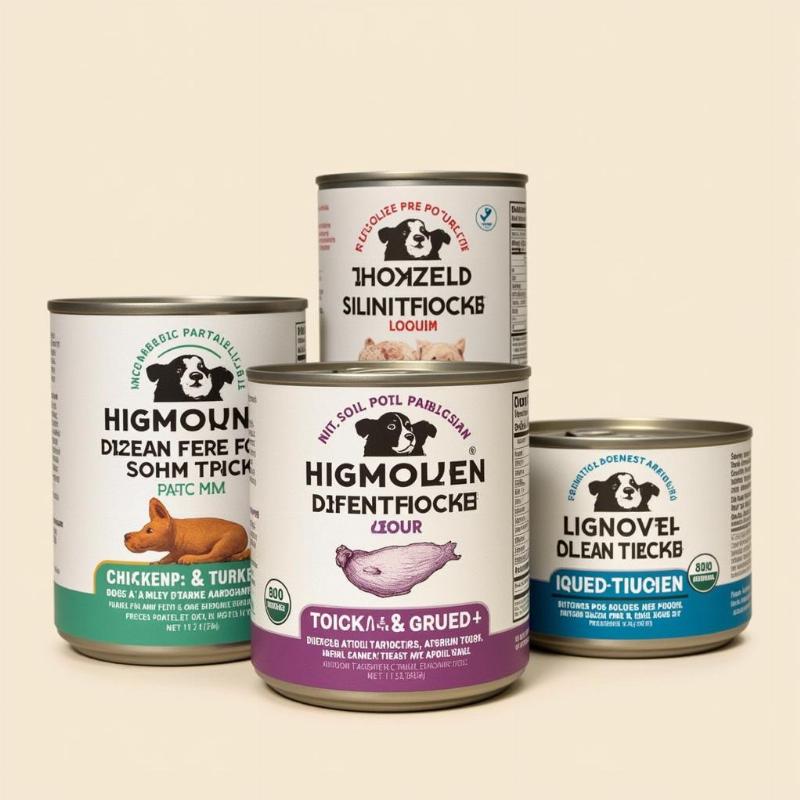Choosing the best senior canned dog food is a crucial decision for loving pet owners. As our canine companions enter their golden years, their nutritional needs change. Senior dogs often require specific diets to support their aging bodies and maintain optimal health. Finding the right canned food can address these needs, providing a palatable and easily digestible option for seniors. This article delves into the essential factors to consider when selecting the best senior canned dog food for your beloved pet.
Understanding Your Senior Dog’s Nutritional Needs
Senior dogs, typically those over seven years old, experience a gradual slowdown in metabolism and may become less active. This often leads to weight gain, so choosing a food with appropriate calorie content is essential. Look for canned food formulated for senior dogs, as these options typically contain fewer calories and higher fiber content to promote healthy weight management. Additionally, senior dogs benefit from increased levels of antioxidants to support their immune system and cognitive function.
Key Nutrients for Senior Dogs
Essential nutrients for senior dogs include glucosamine and chondroitin for joint health, omega-3 fatty acids for cognitive function and skin and coat health, and easily digestible proteins to maintain muscle mass. Many senior canned dog foods are also formulated with added vitamins and minerals to support overall health.
Factors to Consider When Choosing Senior Canned Dog Food
When selecting canned food for your senior dog, several factors warrant careful consideration.
- Breed-Specific Needs: Some breeds are predisposed to certain health conditions, such as hip dysplasia in larger breeds. Consider breed-specific formulations that address these concerns.
- Health Conditions: If your senior dog has any underlying health issues, such as diabetes or kidney disease, consult with your veterinarian to determine the most appropriate diet.
- Ingredient Quality: Opt for canned foods made with high-quality, easily digestible ingredients, avoiding artificial colors, flavors, and preservatives.
- Moisture Content: Canned food has a higher moisture content than dry kibble, which can be beneficial for senior dogs who may be prone to dehydration.
- Palatability: As dogs age, their sense of smell and taste can diminish. Choose a palatable canned food to encourage healthy eating habits.
Best Canned Dog Food for Senior Dogs with Specific Needs
Addressing specific health needs through diet is crucial for senior dogs. health extension canned dog food often caters to a range of dietary requirements.
Senior Dogs with Sensitive Stomachs
For senior dogs with sensitive stomachs, look for canned foods with easily digestible proteins, such as chicken or turkey, and avoid common allergens like beef and wheat. Probiotics and prebiotics can also support healthy digestion.  Canned food for senior dogs with sensitive stomachs
Canned food for senior dogs with sensitive stomachs
Senior Dogs with Joint Problems
Joint problems are common in senior dogs. Canned foods enriched with glucosamine and chondroitin can help support joint health and mobility. Look for best miniature schnauzer dog food options if you own this breed, known for joint issues.
Making the Switch to Senior Canned Dog Food
Transitioning your senior dog to a new food should be done gradually to avoid digestive upset. Start by mixing a small amount of the new canned food with their current food, gradually increasing the proportion of new food over several days. best food for senior dogs with bad teeth can also be incorporated if dental issues are present.
Conclusion
Choosing the best senior canned dog food is a vital step in ensuring your aging companion’s health and well-being. By understanding their nutritional needs and considering factors such as breed, health conditions, and ingredient quality, you can provide your senior dog with a nourishing and enjoyable diet. best dog food for dogs with no teeth becomes especially important for dogs experiencing severe dental problems. Remember to consult with your veterinarian for personalized recommendations based on your dog’s individual needs.
FAQ
- When should I switch my dog to senior food? Most dogs benefit from switching to a senior diet around seven years old, but this can vary depending on breed and individual health.
- What are the signs my senior dog needs a different food? Changes in weight, energy levels, coat condition, and bowel movements can indicate a need for dietary adjustments.
- Are there special considerations for senior dogs with dental problems? Yes, green tripe raw dog food can sometimes be a suitable option, but consult your vet first. Softer canned foods are generally easier for senior dogs with dental issues to eat.
- How can I encourage my senior dog to eat if they’ve lost their appetite? Try warming the canned food slightly or adding a small amount of low-sodium broth to make it more appealing.
- Is it okay to mix canned and dry food for senior dogs? Yes, combining canned and dry food can provide a balanced diet and cater to different preferences.
Beautdogs.us is your premier online resource for all things dog-related in the United States. We offer expert advice on dog breeds, care, and product recommendations to ensure your furry friend lives a long, healthy, and happy life. Whether you’re a seasoned dog owner or just starting your journey, Beautdogs.us is here to support you every step of the way. Contact us for personalized guidance and recommendations at [email protected] or call us at +1 501-555-7529.